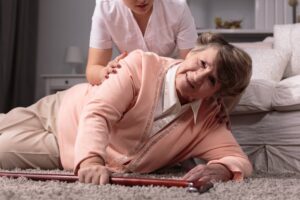What Should I Do if My Mom Fell in a Nursing Home and Broke Her Hip?
Abuse and NeglectThis is not an uncommon question: “My mom fell in a nursing home and broke her hip, and I do not feel safe sending her back. Is someone responsible?”
When a person in a nursing home falls and suffers an injury, it is often because of nursing home negligence. They have a legal duty to create a safe place for your family. If they fail, and your family member falls and suffers injuries, you can hold them responsible for the losses.
It is up to you to prove negligence occurred, but a skilled nursing home abuse attorney can do that for you.
These steps if you feel your family member’s injuries resulted from neglect or if the nursing home will not provide you with a reasonable explanation of what occurred.
What You Should Do After a Parent Falls at a Nursing Home
A nursing home fall attorney will guide you on what to do in your specific situation, but you should report what occurred properly in nearly all scenarios. This includes reporting what happened to the nursing home staff and the state. Doing so ensures proper oversight to find out what happened and why it occurred.
States have very specific rules in place about how nursing homes must maintain their location, provide care for staff, and facilitate the needs of a safe environment. Any violation of this can be a sign of negligence. By reporting what happened, you initiate an investigation by the state that should determine if the location is safe.
It is not the state’s responsibility to fight for negligence for your family member. That is up to you and something your nursing home neglect attorney can do for you.
Do not assume that the appropriate changes will happen to prevent further falls without action.
- Contact your nursing home injury attorney first.
- Contact the state to report the injury and ask for an investigation.
- If any suspected signs of abuse causing the fall, such as being pushed or dropped, report the incident to the local police department.
Your attorney can then advise you on the next steps based on the details of your case. This often involves moving your parent to a new location or getting extra support in the current nursing facility. Always be proactive and assume that if it happens one time, it will happen again.
Understand Why the Accident Occurred
One of the most important steps for family members in cases like these is to understand what occurred. This will ultimately determine if negligence occurred and how to prevent the injury in the future.
The U.S. Centers for Disease Control and Prevention share that someone who falls is twice as likely to fall again if they are over 65. Considering this, you want the space where your family member will live to not consistently create a risk of falling.
Consider common causes of falls in nursing homes
The first step is to know what to look for in why nursing home accidents like this happen.
The Agency for Healthcare Research and Quality points to several specific reasons falls like this tend to happen:
- Environmental hazards, such as slippery floors or carpeting that is not flat
- Medication side effects
- Behavioral symptoms and unsafe behaviors
- Chronic disease changes
- Unsafe equipment
- Lack of supervision
- Unsafe use of personal care items
- Unstable furniture
- Poor lighting
- Difficult to manage clothing
- Bad footwear
- Missing equipment components
- Inaccessible personal items (leading to rolling out of bed)
If your family member fell and broke a hip, you need to determine what caused the fall in the first place. Any of these areas may exhibit negligence, and establishing accountability depends on understanding the circumstances leading to the fall.
By identifying the root cause, you can take appropriate action to address the negligence and seek compensation for any resulting injuries or damages. Consulting a knowledgeable attorney can guide you as you navigate this process and protect your loved one’s rights.
Determine what created the problem
Next, consider why that caused the problem. This can establish negligence for a nursing home fall.
The following are some examples:
- The nursing home was short-staffed. No one could help your family member to the bathroom.
- A lack of maintenance leads to wet floors or cluttered hallways, causing the fall.
- The nursing staff provided the wrong medication or dosing, leading to increased risks of dizziness and falling.
- A staff member did not use the proper equipment to help support the other party when walking or standing.
- A person was abusive to your family member, dropping them or allowing them to fall off the bed.
- Nurses did not notice or monitor for changes in your family member’s mobility, health, medication changes, or cognitive function, limiting their ability to spot risks.
- A lack of safety equipment, such as bed rails, bed alarms, or bathroom railings, created the fall risk.
By understanding what occurred to lead up to the injury, you can determine if negligence caused the fall. Negligence causes most of these situations.
Do Not Overlook Pursuing Compensation for Hip Injuries After Falls
When a person falls and breaks a hip, they are likely to suffer significant and ongoing health complications that can impact them in many ways. As a result, they must have access to the care they need, the advanced medical treatment available, and financial compensation for their losses.
Breaking a hip can kill seniors
UCLA Health provides a clear understanding of some complications from hip fractures in seniors. Those who are older are already frail.
As a result, a hip fracture may mean:
- Difficulty healing
- A higher risk of infection due to less mobility and limited care
- Blood clot risks increase, creating a risk of a pulmonary embolism or stroke
- Limited mobility often leads to difficulty with personal hygiene, increasing the risk of urinary tract infections
- Lack of movement leads to a higher risk of pneumonia
- Surgical procedures may be very risky for those who are older and already have heart-related complications
- Pain may be ongoing and debilitating
- A decreased quality of life
Unfortunately, hip failures often lead to poor outcomes for patients. When your family member suffered such an injury because of nursing home negligence, take legal action.
The CDC notes that hip fractures result in 300,000 hospitalizations of people over the age of 65 each year in the U.S. Your family member needs the care and support they deserve after these difficult situations.
Filing a Lawsuit for Hip Fractures from Nursing Home Falls
Liability in nursing home falls may seem complicated. It does not have to be. If a staff member or the nursing home facility failed to provide adequate care to a person, and they fell or broke a hip, they should be responsible for the losses. The nursing home must keep its residents safe.
To file a lawsuit in a case like this, work with an attorney. Several factors may affect your ability to file a lawsuit and receive compensation.
Proving negligence through evidence
 Your attorney will gather evidence to prove nursing home abuse or neglect occurred, resulting in the injury.
Your attorney will gather evidence to prove nursing home abuse or neglect occurred, resulting in the injury.
You, as a family member, may not have access to this information directly:
- Witness statements from your family member, others in the room, staff, and other residents
- Nursing care logs, including who cared for the patient and when
- Data from the medical providers about the cause of the fall
- Evidence in the space, such as damage to carpeting, flooring, items on the floor around the person
- A lack of safety equipment
- A lack of maintenance records
- Noted changes in a person’s medical schedule
- Lack of adequate staffing at the time of the fall
All this information can tell the story of what occurred and why. It is this that helps to formulate your case.
Determine if the nursing home’s reckless behavior caused the injury
Your attorney will surmise from the evidence if the accident resulted from reckless behavior or negligence. Negligence occurs when the nursing home does not provide a safe location or support for the resident, especially when they know of a risk and fail to take care of it.
Consider some of the more common reasons this happens:
- An untrained person picked up a person and dropped them
- Improper use of a gait belt occurred
- The staff did not have enough support for a two-assist resident
- The room’s equipment was not quickly inspected or repaired
- The person mopping the floors did a poor job, resulting in slippery conditions
- A nursing staff member overmedicated a patient
- No one responded for help soon enough, resulting in a family member getting out of bed
- Safety measures, such as bed alarms and railings, were not used
If you feel that any of these scenarios exist, you are justified to seek compensation from those responsible for the losses. Again, do not assume the nursing home will take action to prevent this.
Filing a claim for losses
 In negligence situations, the victim can file a claim for compensation for their losses.
In negligence situations, the victim can file a claim for compensation for their losses.
This may include:
- Medical expense losses, including surgical care, hospital stays, specific focused care, and other types of required medical care
- Pain and suffering
- Care for rehabilitation and recovery, including costs associated with supportive equipment, is now necessary.
In some situations, a fall and broken hip can lead to a person’s health declining. A lack of mobility, infection risk, health complications from surgery, and other factors can result in death. If negligence caused the hip fracture, you may pursue a wrongful death claim. This can include the recovery of additional damages.
Protecting Your Family’s Future
Nursing home residents often need to return to a skilled treatment center after a fall like this. Many times, they now need more care than before. As a result, you may be terrified about what this can mean for your family member.
Will they fall again? Can you trust this location?
Determine if they can move to another location where care may still meet their needs and financial requirements. It may be possible to do this when you simply do not trust.
Even if they have to go back to the same location:
- Be informed. Know what steps the location is taking to minimize the risk of nursing home falls.
- Be present. Show up unexpectedly at various times. Encourage other family members to do the same. That ensures active attention to your loved one.
- Be aggressive in defense of your family member. They may not like you, but it can mean protecting your family member’s life. Be sure they know you expect safety measures in place and get a care plan outlining this.
Work With a Trusted Nursing Home Abuse Attorney Throughout This Process
When your family member falls and breaks a hip at a nursing home, you may not know your legal options. By speaking to a personal injury attorney directly, you gain insight into what specific legal rights you have to pursue financial compensation and changes that can safeguard your family.
Your attorney can actively file a claim or lawsuit against the negligent location. They can also guide you in drafting documents or reading through contracts that outline your right to take legal action or their responsibility to provide care before you sign them. Speak to an attorney with nursing home experience to receive needed support and to understand the legal implications of your case.
Nathan Hughey, an attorney and fourth-generation South Carolinian, founded Hughey Law Firm in 2007. Before that, he spent five years defending nursing homes and insurance companies. Leveraging his experience, he now advocates for those injured or wronged by such entities, securing over $220 million in verdicts and settlements.
